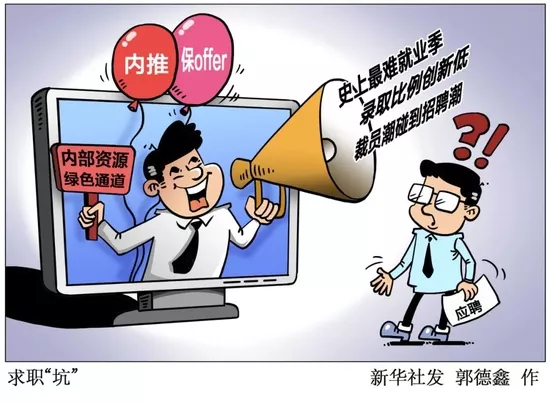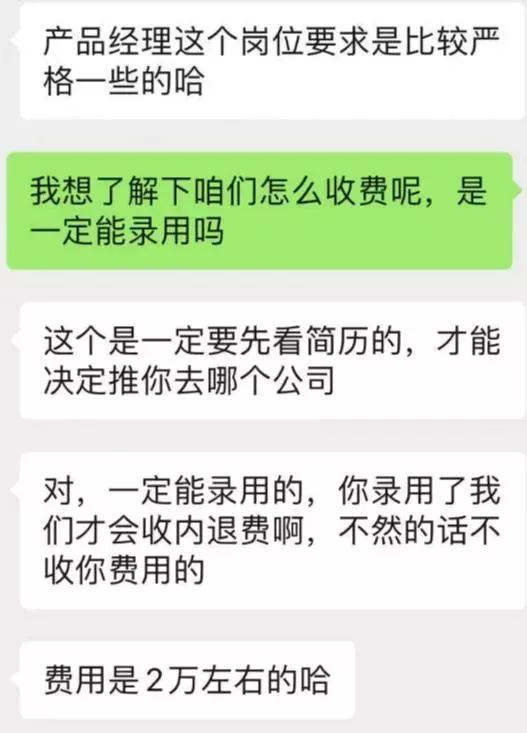On the one hand, the popularity of "paid internal promotion practice" stems from the fact that some college students have no less complex about entering large and well-known enterprises for employment; On the other hand, facing the increasingly complex and severe employment situation, the demand for internship of graduates is more vigorous. To prevent college graduates from falling into such traps, it is necessary to create a safe, orderly, fair and reasonable employment environment.

"15000 yuan has been guaranteed" and "no written examination is required, but the interview process is OK"... Recently, some institutions and individuals appeared on the network platform, falsely using the names of securities companies and researchers to recruit interns, or publishing false recruitment information, asking for relevant fees, and vigorously promoting payment. Subsequently, relevant securities companies made public statements on recruitment matters one after another, emphasizing that official recruitment is the only channel and will reserve the right to investigate the legal liability of those who publish false information.
The "paid push practice" initiated in the financial industry is not new. As early as a few years ago, some media reports exposed the chaos of "paid internal push" in the financial industry: some paid internal push internship projects and fees have nothing to do with the internship units, which is purely network intermediary fraud; There are also some intermediary platforms linked with "insiders" of enterprises, but they are not official acts of enterprises. No matter which form, the profit-making purpose of "paid internal push" has become clear. Even if what they do is not fraud, it is not reasonable for them to charge high internship fees.

However, although many well-known enterprises have declared that "paid internal push practice" has nothing to do with themselves, and the society has repeatedly called on college students not to believe such publicity, the current situation of "paid internal push practice" has not changed. The reasons are as follows: on the one hand, some college students have no less complex about entering large and well-known enterprises for employment, and the payment push fits their psychological needs of eager internship and employment; On the other hand, from the perspective of supply and demand, in the face of the increasingly complex and severe employment situation, the demand for internships of graduates is more vigorous. The scarcity of employment and internship opportunities provides an external environment for bad intermediaries to make illegal profits in the name of employment units. The absence of relevant laws and regulations, as well as the difficulties in the supervision of network technology, have also contributed to the barbaric growth of "paid internal promotion". In addition, the agreement trap, contract trap or probation trap set by some employers often make graduates have no way to help.
In fact, the chaos of fee practice has long been concerned by the regulatory authorities. At the beginning of this year, the Ministry of education and other eight departments jointly issued regulations to clearly "prohibit illegal organization of internships for profit". Due to the impact on the company's image and potential disputes, in recent years, the chaos of paid internal promotion internships has also been concerned and rectified by many financial institutions, such as strengthening the management of regular employees, expanding the number of holiday interns, improving the tone of internships, etc.
It is the responsibility of the government and society to help graduates find jobs smoothly. To avoid college graduates falling into the trap of employment and internship, all parties need to work together to create a safe, orderly, fair and reasonable employment environment for them. On the one hand, government departments should work with enterprises, schools and college graduates to purify campus recruitment and internship information through the "firewall" system, especially to regulate the labor market, especially the behavior of network intermediaries, and effectively reduce the job-hunting cost of college students. On the other hand, as job seekers, college students should also strengthen their own legal education, do not credulous employment shortcuts, improve their job security awareness and prevention ability, and use legal weapons to safeguard their rights.